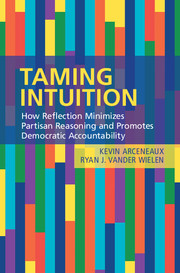Book contents
- Frontmatter
- Contents
- List of Figures
- List of Tables
- Preface and Acknowledgments
- 1 Democratic Accountability and the “Rational” Citizen
- 2 A Theory of Individual Differences in Reflection and the Intuitionist Model of Political Reasoning
- 3 Measuring Individual Differences in Reflection
- 4 Toeing the Line: Partisan Identities and Policy Attitudes
- 5 Throwing the Rascals Out: Partisan Identities and Political Evaluations
- 6 Can't We Disagree without Being Disagreeable? The Role of Reflection in a Polarized Polity
- 7 Reflections on the Role of Reflection in Democracies
- Appendix Details of Empirical Studies and Statistical Analyses\
- Notes
- References
- Index
3 - Measuring Individual Differences in Reflection
Published online by Cambridge University Press: 30 August 2017
- Frontmatter
- Contents
- List of Figures
- List of Tables
- Preface and Acknowledgments
- 1 Democratic Accountability and the “Rational” Citizen
- 2 A Theory of Individual Differences in Reflection and the Intuitionist Model of Political Reasoning
- 3 Measuring Individual Differences in Reflection
- 4 Toeing the Line: Partisan Identities and Policy Attitudes
- 5 Throwing the Rascals Out: Partisan Identities and Political Evaluations
- 6 Can't We Disagree without Being Disagreeable? The Role of Reflection in a Polarized Polity
- 7 Reflections on the Role of Reflection in Democracies
- Appendix Details of Empirical Studies and Statistical Analyses\
- Notes
- References
- Index
Summary
The purpose of this chapter is to elaborate on and justify our empirical approach to measuring individual differences in reflection. To do so, we look to the ways in which psychologists measure how people differ in their cognitive style, or the way in which people mentally attend to information. We recruit two measures of cognitive style, briefly discussed in the previous chapter, that capture one's need for affect and need for cognition. These measures of cognitive style capture differences in how much people are motivated to seek out and feel emotions and how much they are motivated to think. As we explain, we believe that together these differences in psychological motivations shape people's willingness to engage in reflection.
Because these measures are somewhat novel to the study of politics and we propose using them in somewhat novel ways, we begin this chapter by placing the need for affect and the need for cognition in the context of the fields in which they were developed and explain why we believe they can also be leveraged to serve our goals. We then spend the remainder of the chapter empirically evaluating the validity of these measures as a way to capture people's propensity to engage in reflection by demonstrating that they are correlated with theoretically related constructs and uncorrelated with distinct constructs. In doing so, we also introduce the data, drawn from several studies, that will serve as the basis for the empirical tests undertaken in the remaining chapters.
NEED FOR COGNITION
The empirical study of individual differences in cognitive style begins with the need for cognition. Originally proposed by psychologists Arthur Cohen, Ezra Stotland, and Donald Wolfe (1955, 291), the need for cognition was defined as “a need to structure relevant situations in meaningful, integrated ways.” They argued that this need varies across individuals in intensity, causing those with a stronger need for cognition to devote more energy to making sense of the world, especially when confronted with ambiguous situations where one must figure out how facts and events are connected. A little over twenty-five years later, John Petty and John Cacioppo (1981, 1986) placed the concept at the center of their Elaboration Likelihood Model (ELM) of persuasion and refined its measurement.
- Type
- Chapter
- Information
- Taming IntuitionHow Reflection Minimizes Partisan Reasoning and Promotes Democratic Accountability, pp. 46 - 87Publisher: Cambridge University PressPrint publication year: 2017



